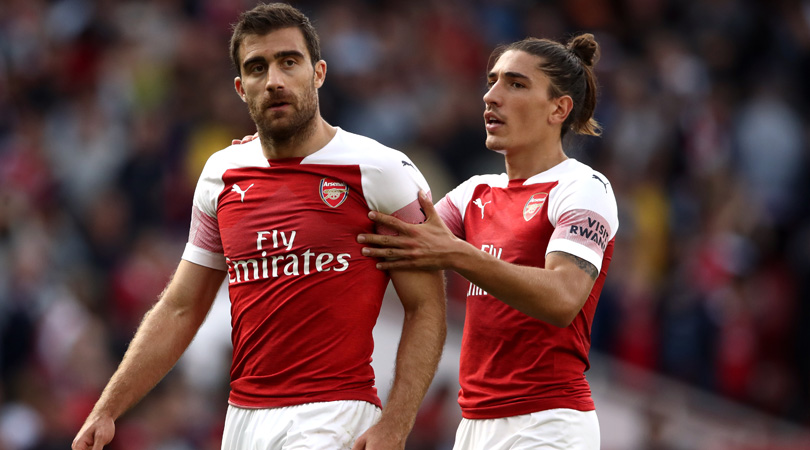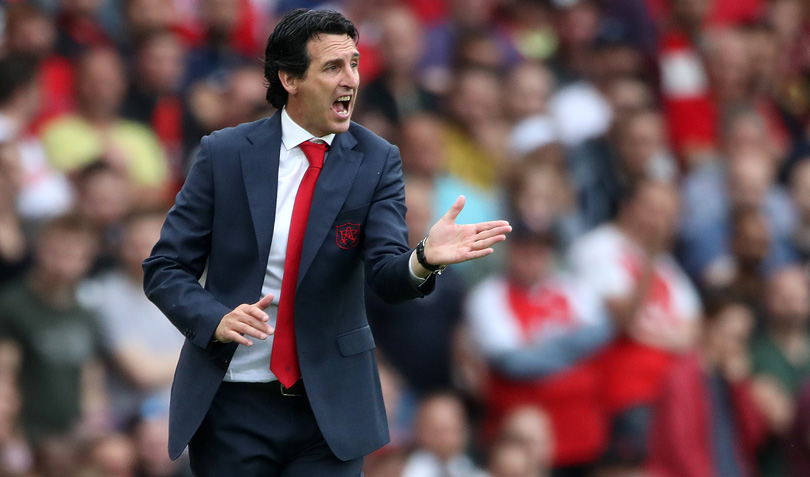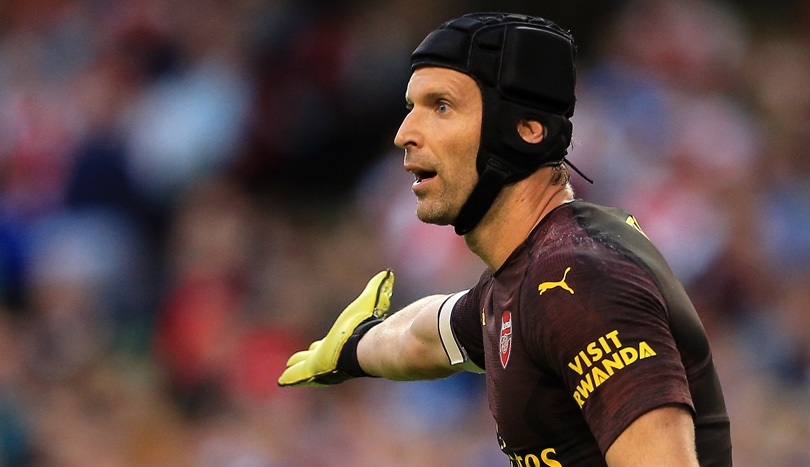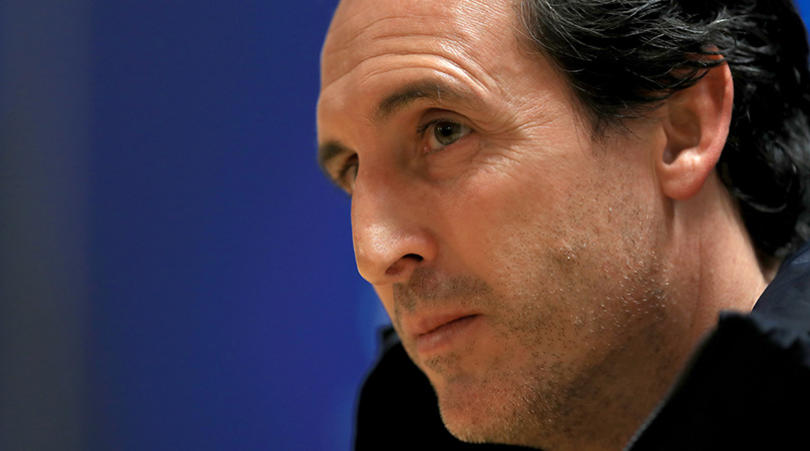Why Arsenal’s defensive woes have worsened under Unai Emery – and improvement looks far away
The Gunners conceded 51 goals last season, yet started this term with even fewer defensive options. Chas Newkey-Burden examines Arsenal’s ongoing problems

Shortly after he took the reins at Arsenal, Unai Emery captured attention when he said: “I prefer to win 5-4 than win 1-0.” Gunners fans were amused and excited, but after a defensively calamitous start to the season, the joke is already starting to wear thin.
From the moment that the prowling Spaniard arrived in north London, it was clear he had a job on his hands sorting out the Arsenal defence. During the previous season, the team had shipped 51 league goals – the club’s worst defensive record of the Premier League era. Many of those goals were conceded in comical fashion.
So far this campaign, the Gunners have leaked eight times in four matches - a higher ratio than last season. They conceded the most shots on target of any team over the first three matches and were particularly shambolic defensively against West Ham, despite a 3-1 win. The Hammers managed 13 shots from just 30% possession and the ease with which they found space behind the Arsenal back four was terrifying.

In a 3-2 win at Cardiff, Emery’s men allowed the hosts – goalless from their first three matches against Bournemouth, Newcastle and Huddersfield – to come from behind twice. Petr Cech’s distributional dread and Danny Ward’s unmarked header drew snorts from onlooking neutrals. Arsenal had 15 attempts on goal with 72% possession, but Cardiff managed 14 with just 28% of the ball.
Should teams like Cardiff and West Ham be faring this well against Arsenal?
Of course, it’s too early to draw significant conclusions about Emery, especially as his side were handed a tough start against Manchester City and Chelsea for the first two ties. At times, though, his team have been reminiscent of Kevin Keegan’s Newcastle: an expensively assembled attack and a comically calamitous back four. There’s a nagging worry that defensive clownery could become a defining feature of Arsenal’s campaign. Need cheering up? Just tune in to a Gunners match. ‘Boring, boring’ Arsenal they most certainly aren't.
Warning signs
Get FourFourTwo Newsletter
The best features, fun and footballing quizzes, straight to your inbox every week.
Maybe the writing was on the wall from the summer. Emery’s seemingly pragmatic approach drew a degree of respect, but the mathematical reality is that the Gunners went into the season short of defensive options – a familiar criticism of Arsene Wenger each August.
With Laurent Koscielny injured long-term, Per Mertesacker retiring and Calum Chambers sent to Fulham on loan, Arsenal started the season three down at the back. But Emery bought in only two new defenders: Sokratis, aged 30, and the 34-year-old Stephan Lichtsteiner. This left the defence, numerically at least, shorter under Emery than it was under Wenger last term. The new gaffer’s attention to detail is much discussed, so why did he think his team needed fewer, not more, defensive options?
The Chambers loan seemed particularly bewildering. While the youngster probably wouldn't have been the answer, he might have formed part of an answer, at least by keeping those ahead of him on their toes. Complacency has been a problem at the Emirates for some time, and a lack of competition for places is an inevitable breeding ground for comfort.
Arsenal’s longstanding defensive issues stretch beyond the back four. Granit Xhaka has been a worry since long before Emery arrived. The puzzling, polarising midfielder, who gave away possession for one of Cardiff’s equalisers, is the latest in a succession of modern Gooners who give the ball away as if it’s a ticking grenade. See previous offenders: Alexis Sanchez and Alex Oxlade-Chamberlain.

In 2016, the Swiss, was described by Wenger as a “box-to-box player”, one who is “more of a deep playmaker than a box-to-box player”, and a midfielder who prefers to “sit” but “likes to play forward”. At the time, FourFourTwo wondered: what the heck was going on with Xhaka? Two years on, we're no closer to the answer.
He is certainly not the defensive midfielder many hoped he would be, and the Gunners' defence suffers accordingly. But then who is? When the reasonably frail back four look upfield for protection, they’ve often been as likely to see silk as they are steel.
Now, they also see wide, open spaces. Many high-press teams are vulnerable at the back, but as Emery gradually implements his vision, the central midfielders are simply not spreading wide to cover the full-backs. Positioning is poor, concentration and communication have also been sub-standard. There’s so much to work on.
Instant changes
Is Lucas Torreira the answer? The snappy midfielder has caught the eye during his cameo appearances. He pops up out of nowhere like a terrier, disrupts the passing of the opposition, and distributes simply and accurately. He also seems to improve Xhaka’s play.
Emery says Torreira “needs to continue working”, but after his almost flawless substitute appearance against Cardiff, surely he’s sweated enough for a start. Arsenal fans are a peculiarly squabbling bunch but there’s probably not a Gooner on the planet who wouldn't welcome the Uruguayan into their team's first XI.
Match time for new signing Bernd Leno would also be popular. Cech’s wince-worthy discomfort with the ball at his feet is simply farcical. He nearly tapped it into his own net against Manchester City, then made two howlers in the first eight minutes against Cardiff. Opponents are onto it and charging at him.

A goalkeeper’s nerves spread like a virus into the back four, so it’s time to put everyone out of their misery and start with Leno, who’s famed for being comfortable with Emery’s preferred vision. It's hard to see what is delaying the inevitable. Don’t let his boyish features fool you: the £19m man is a 26-year-old with nearly 300 senior games for club and country.
Dreams of a neat, linear improvement under a new boss are misguided. Transitional seasons are usually staccato, inconsistent affairs, but the absence of even a hint of defensive progress over the opening four matches is disappointing.
Older Arsenal fans might recall a quintessential comment from former manager George Graham, following an exciting 5-2 victory over Sheffield United in 1991. He said he would have preferred to have won 2-0 or 3-0, as 5-2 was “too cavalier”. Typical Graham – but a bit of this pragmatism wouldn’t go amiss at Arsenal right now.

